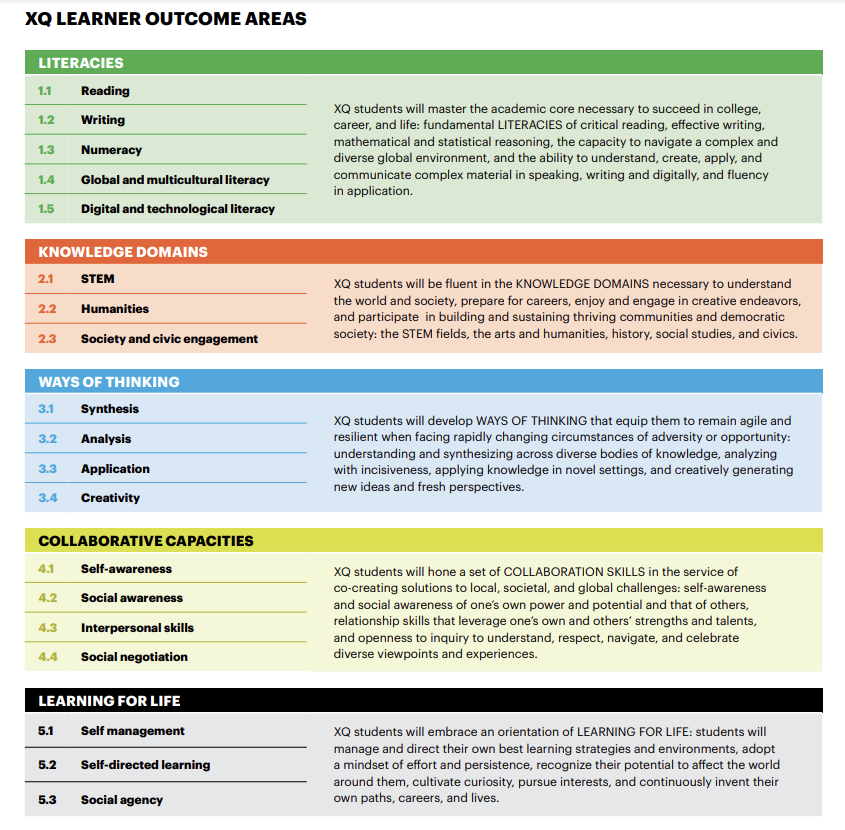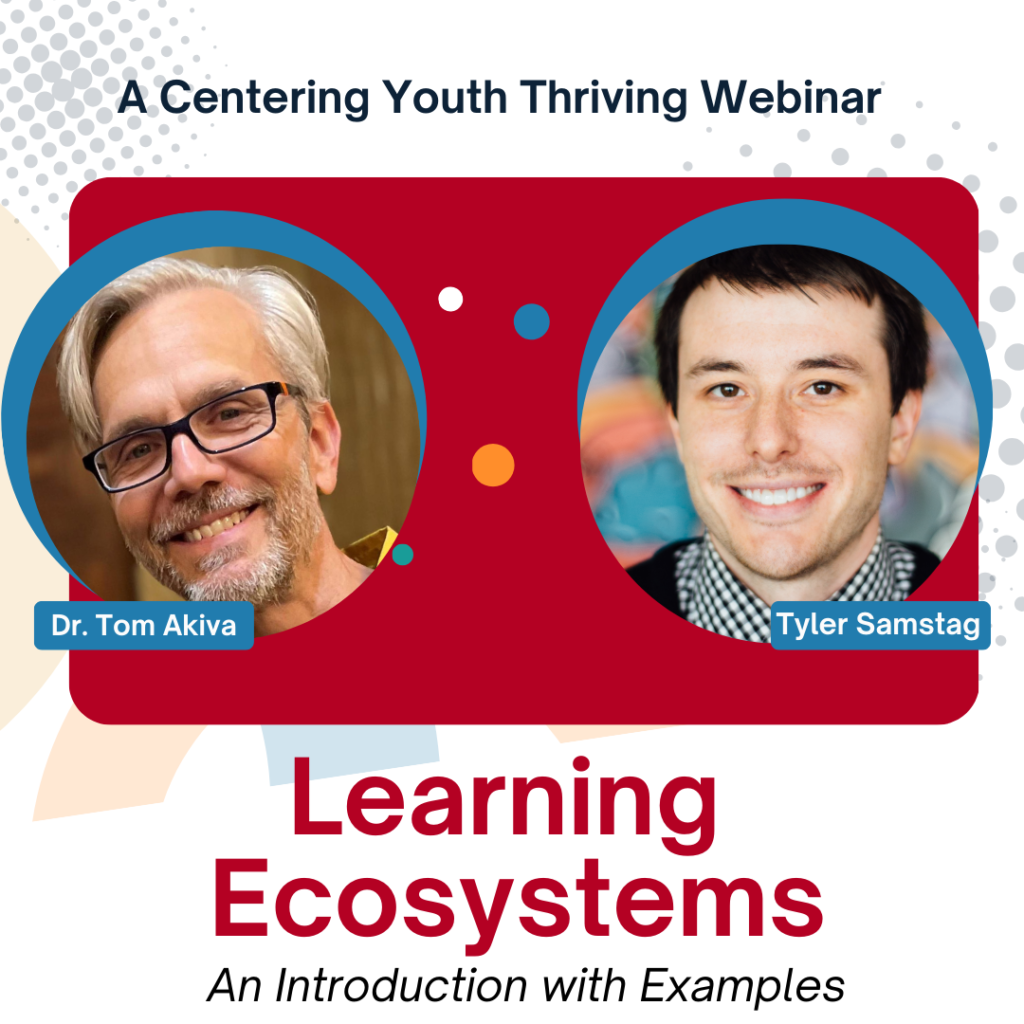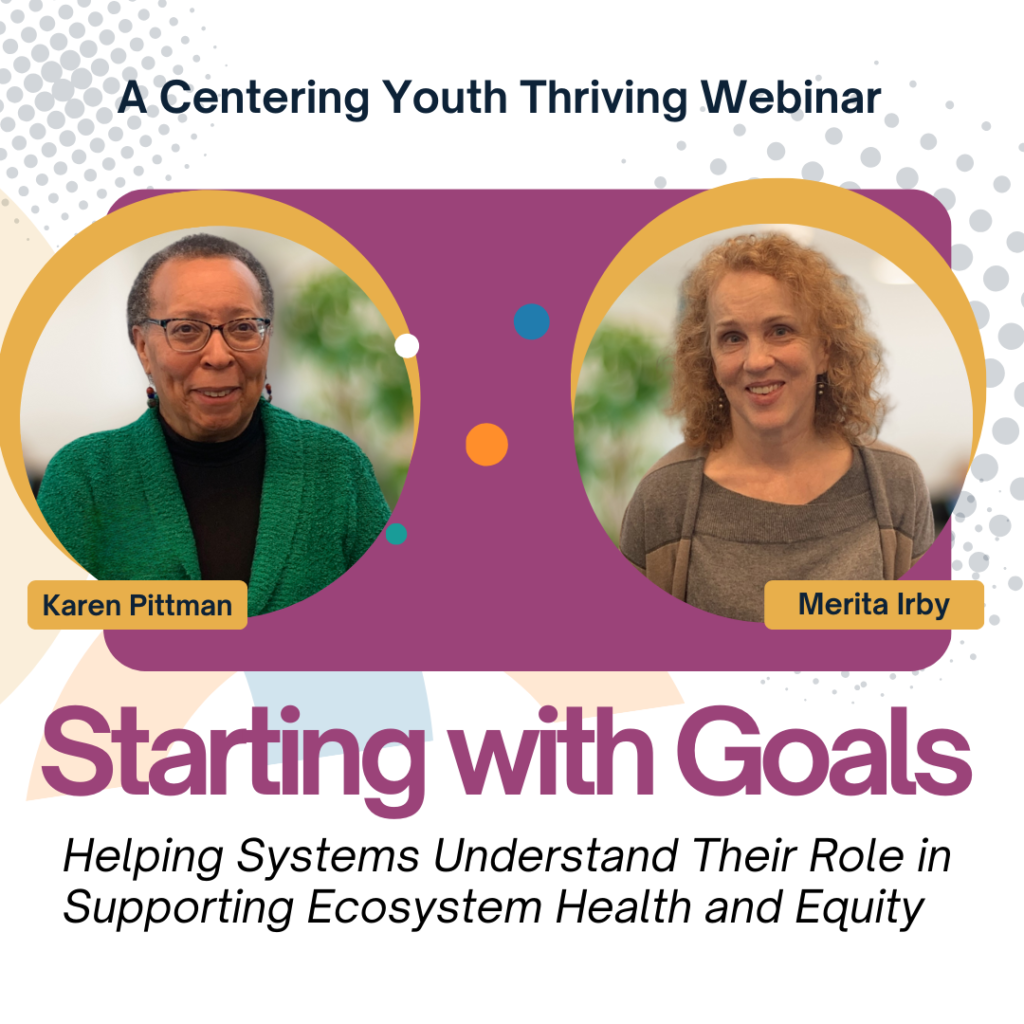
Learning ecosystems are complex, dynamic webs of interaction between people, places, and possibilities that shape our learning experiences. Every community has these core elements. People in families, neighborhoods, businesses, and organizations committed to learning. Schools certainly, but also childcare centers, museums and libraries, afterschool and summer programs, parks and recreation centers, and civic organizations.
In our first Centering Youth Thriving webinar, Tyler Samstag (Remake Learning) and Tom Akiva (University of Pittsburgh) explained that, while learning ecosystems exist everywhere, it takes careful stewardship to help them thrive and ensure that they are equitable. In their recently released report, Shift, Remake Learning is careful to point out that the learning ecosystem is not a replacement for schools, but a “both/and” vision that “embraces all that schools can be by tending to the vital lifelines that link schools to the rest of life.”
Most of us gravitate towards this vision intuitively. There is something not only appealing but urgent, given the speed with which the world is changing, in blurring the lines between school and community to maximize opportunities for real-world learning, competency-testing, and community building.
Most of us, however, also scratch our heads when asked what it will take to help schools, especially high schools, shift from looking inward to looking outward so that they can “embrace all they can be.” And we furrow our brows when asked what it will take to help school systems make these shifts, noting that systems-level change is the only way to ensure equity.
Michele Cahill and her colleagues at the XQ Institute tackled this challenge head on almost a decade ago when they sponsored a national competition that provided funding and technical assistance to communities prepared to truly rethink high school. The XQ team learned a lot by watching local leaders move theory into practice. They joined us in a recent webinar to explain the evolution of their framework, share their tools, and give participants an opportunity to use them.
Michele, who has been at the helm of major education and youth development initiatives for over 50 years, opened up our webinar discussion by summing up XQ’s purpose and her own personal mission:
“Centering youth thriving is our life’s work… At XQ we are fully devoted to reimagining high school to prepare young people to thrive…to support the adults in their lives and support youth themselves to develop the kind of knowledge, skills, and attributes that will enable them to thrive intellectually, emotionally, as citizens, as members of communities, and progress in their education and economic futures.”
And then, with the ease of someone who has come to the simplicity that lies on the other side of complexity, Michele explained why systems are needed to support ecosystems.
“When talking about school systems, we are talking about systems of schools and systems of learning that generate participation from entire communities and generate a new kind of relationship between students, educators, and community educators in many types of situations so that young people have multiple opportunities.”
Systems, in short, that are designed to prioritize ecosystem stewardship to optimize youth thriving. Youth thriving, as explored in our second webinar of this series, is more than ranking well on static well-being indicators. Thriving is about competencies, identity, agency, purpose. It is about using one’s assets to achieve individual and collective goals.
XQ has made deep investments in developing a research-based, practice-tested competency framework that aligns with the broader goal of supporting youth thriving. How? By directly addressing the challenges associated with the separate ways we currently measure and support academic, social and emotional growth. They’ve done the homework to demonstrate both alignment with state academic standards and with the growing knowledge base around social and emotional competencies and are providing the tools and resources to help students name and claim their learning. The XQ Competency Framework provides a unified way for learners and educators to see the value of naming and building competencies across five learner outcomes that marry core academic content with the social, emotional, and cognitive competencies needed to succeed in a rapidly changing world.
The scaffolding of the XQ Competency Framework includes 37 competencies that are broken down further into 118 component skills, each of which is described in “I” statements that progress from emerging to fully applying, allowing learners and educators to see themselves and chart their progress.
Presented in standard chart form, this would be absolutely overwhelming. But the extraordinarily user-friendly app and on-line tools are far from standard. Users are encouraged to move from the abstract to the concrete by clicking into a learner outcome and selecting a few competencies or even specific skills that seem relevant for their growth. They are then encouraged to think through learning experiences that would support their growth or pick an existing learning experience (usually a 3 to 6 week session) and unpack how that supports growth in specific competencies.
On the webinar, participants participated in lively “design sprints” to explore the possibilities associated with this building-block approach to developing rich learning experiences. They left with a sense of how doable it can be to link competency growth to learner experiences in specific, transparent ways that are visible to the learner and the educator. And as Michele wisely noted, once educators begin to redesign learning experiences to increase meaning-making and competency development, they begin to push against the traditional architecture of schools.
I encourage you to watch the full webinar (listening isn’t enough because of the rich visuals) and to go on line to explore the incredibly well-layered suite of competency tools and principles for designing learning experiences for educators and learners that bring the XQ Competency Framework to life.
XQ Competency Framework, Design Principles, Tools and examples are available to any and all educators working with youth. Knowledge to Power Catalysts is working to make sure leaders in all of the learning settings youth spend their time have opportunities to experience the value of these resources both as conversation starters, learning experience planners, and youth and staff confidence builders.
Explore the site. Set up a call with us. Let’s continue to work together on ways that support educators as they “tend to the vital life lines that link schools to the rest of life.”






1 Comment
Your blog is a constant source of inspiration for me. Your passion for your subject matter is palpable, and it’s clear that you pour your heart and soul into every post. Keep up the incredible work!